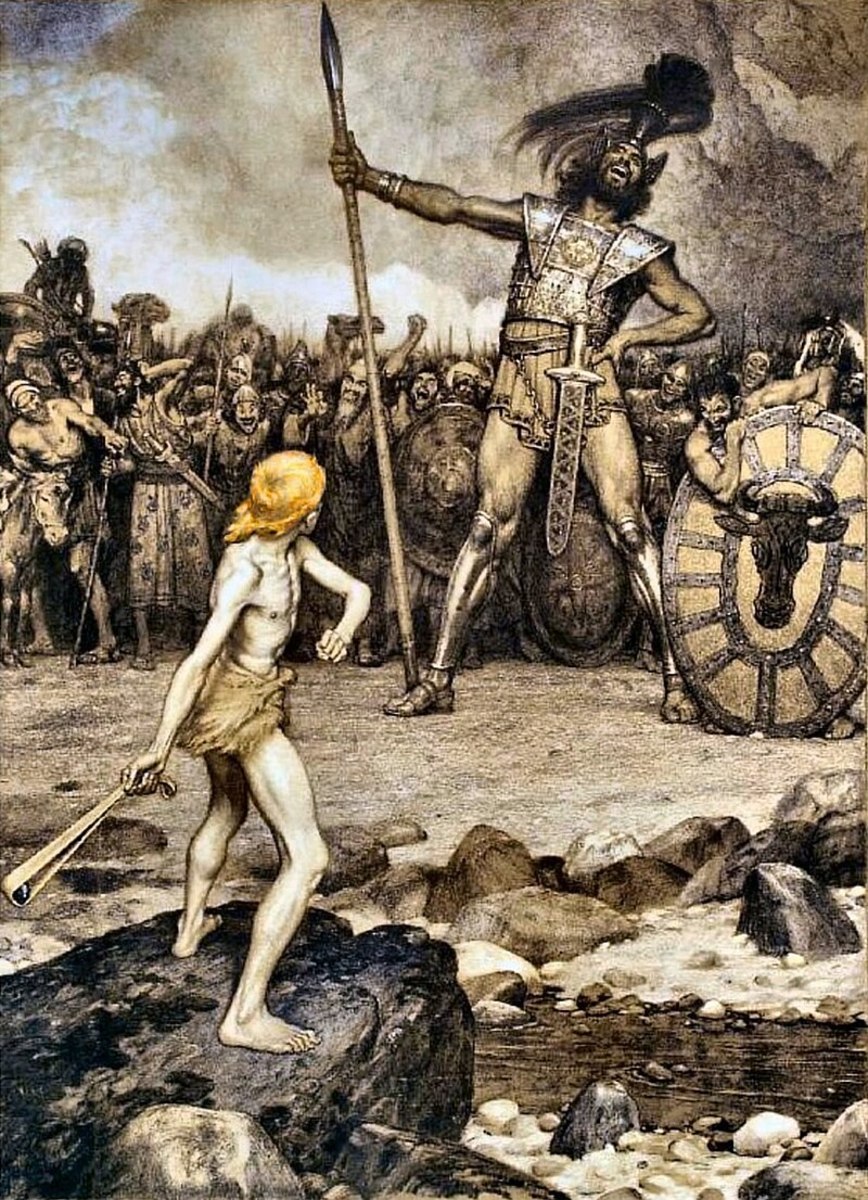How Should Christians Respond to the Israel/Palestine Conflict?

Evangelical Presumptions
I can’t say when I first took a definitive stance on the Israel/Palestine conflict, or even when I began to remotely care about it, but by my mid-20’s, despite the fact that my knowledge of the issue was limited to headlines and pulpit sound bites, it was clear that I was willing to defend, even argue my particular version of the events: Israel belongs to the Jews, Palestinians are fanatic and violent Muslims, and God is on our side. Eschatology unsurprisingly played a big role in the formulation of my beliefs, confined as I was to Pat Robertson’s interpretation of Revelation, the “Left Behind” series, and the terrifyingly effective premillennial horror flick, “A Thief in the Night.”

Isaac and Ishmael: Blessed Sons of Abraham
I have no idea when I first heard it, but in many circles, the belief in eternal enmity between Arabs and Jews was a given, a scriptural truth that was only questioned by the weak in faith. As an adolescent, I was never a passionate student of the Bible. I heard it quoted regularly in church, and was often required to memorize large passages of it in Bible class in my two years attending Coulee Region Christian High. But it just didn’t stick, and for that reason, I was more than willing to digest whatever interpretation my local pastor, my Bible teacher, or Pat Robertson desired to feed me. Unity among the “scholars,” I hoped, was a compelling sign for the truthfulness of our faith. If Pat Robertson or James Dobson wanted me to know that Isaac and Ishmael can never aspire to any relationship above eternal enmity, and that because of this biblical truth, the descendants of Ishmael (Arabs) and of Isaac (Jews), will never stop fighting, why would I discount it? The news of the last decade surely helped strengthen this perspective, and how could an apparently unified front of evangelicals be wrong?
Palestinians: The Other
In the 90’s, and surely today, Palestinians were easy to objectify and dislike (though with little work, isn’t everyone?). The specter of Islamic terrorism was in full swing, implicating nearly every Arab Muslim, and Palestine’s spokesman, Yasser Arafat, struck me as little more than a reactionary and violent terrorist. And in fact, that was really what was at the core of it all: the terrorist Muslim. While this didn’t really hit home until the tragedy of September 11th struck, it was an ever-present reality on nightly news. Kaddafi, Ayatollah Khomeini, and Saddam Hussein were the real-life villains of Arab Middle East, and they were unanimous concerning the evils of Israel. Hence, Palestinians were guilty by association. Even more damning than this, however, was the sheer insanity of the suicide bomber. Reports from Israel claimed that children were practically groomed for this position, and that such a death would be considered a glorious honor:
Arab communities within the civil jurisdiction of self-rule under the Palestinian Authority (which includes 97 percent of the Arab residents in the West Bank and 100 percent of those in Gaza) foster a culture that prepares children for armed conflict, consciously and purposely putting them in harm's way for political gain and tactical advantage in their war against Israel The PA buses children to violent flashpoints far from their neighborhoods and Arab snipers often hide among the young during battle, using children as human shields. Teenaged perpetrators of suicide attacks have become the norm.*
*Eli Hertz, “Myths and Facts,” Purposely Sacrificing Children. http://www.mythsandfacts.org/article_view.asp?articleID=212

As I understood it, Israel-a tiny little country surrounded by hostile Islamists-was, biblically speaking, the Promised Land of the Jewish people. They’d been there before, they were there again, and since the Bible clearly spoke of a restoration of Israel, what was the problem? No one was preventing Palestinians from leaving and taking root somewhere else. With childlike reasoning I maintained that, well, the Jews had been there first, so now, they win. Ishmael would always be a thorn in the side of Isaac, but clearly God was restoring Israel. I say clearly because from my ignorant mindset, Israel’s formation appeared both improbable and providential. For hundreds of years it lay fallow and forgotten, and suddenly, Israel was reborn. Little surprise, I maintained, that the Islamic countries of the world would oppose God’s hand. Iranian President Mahmoud Ahmdinejad, for instance, only helped strengthen my resolve for Israel with comments such as this: “Our dear Imam said that the occupying regime must be wiped off the map and this was a very wise statement. We cannot compromise over the issue of Palestine.”* Hence the evangelical Christian position of default was unswerving support for Israel and an unapologetic condemnation of its enemies. Relationships and education however, can be such pesky things.
*Mahmoud Ahmadinejad, The Israel-Arab Reader: A Documentary History of the Middle East Conflict (London: Penguin Books, 2008), 601.

Perspectives
My first real relationship with Arab Muslims began in 2007, as several Saudi Arabians all lived on the same floor of the apartment complex of a close friend whom I visited often. Delicious meals of cuisine hailing from their home country were brought over often, and invitations for tea and hookahs were extended on at least a weekly basis. I recall sharing with them my plans to see Israel, and no sooner was the country’s name uttered then I was met by a nearly unanimous shout of “Palestine!” I recall being bothered by this, not so much because we disagreed, but because they despised Israel so much they denied its very existence. While I sensed no anti-Semitism, there was a clear, and vocalized, hatred of Israel. Here then, was an example of the other extreme: An unswerving support of Palestine and the demonization of Israelis. To my Saudi Arabian friends, Israel was the “other,” the enemy, and Palestinians, even suicide bombers, could do no wrong. And yet, my Muslim friends were among the most generous and caring people I knew.

First-hand Hatred
A three-month stint in the Middle-east was further evidence of the hospitality that is so prevalent throughout Arab culture. In Beirut, I walked past tanks, political gatherings and Palestinian refugee camps, and yet the only fear I experienced was due to Israeli threats against Lebanon mere days before (Pockmarks from Israeli fighter-jet ammunition coating a building across from my hostel didn’t help). Syria was home to a culture that was awkwardly friendly to one such as myself, coming from the individualistic, lone-ranger mentality culture of the West, and in Alexandria, Egypt, I stumbled across an outdoor wedding celebration and received more attention than the bride and groom!
But, hospitality does not dictate truth, and the hatred so prevalent and inherent in anti-Israel propaganda compelled me to continue in my support for Israel against the rights of the Palestinians. Jews were often referred to as ‘dogs’ in homemade flyers adorning the doors of businesses throughout Lebanon, Syria and Egypt, and the plethora of billboards memorializing previous massacres struck me as little more than one-sided shock tactics erected with the intent of retaining a perpetual sense of injustice gone unpunished. Bright red billboards flanked by Lebanese and Palestinian flags showcased piles of dead bodies and family portraits of the deceased, all as an enduring testament to what Israel was capable of, an entity of which the majority of Lebanese identified as their enemy. Though years had passed, motorists in Beirut could be reminded daily of the 1982 massacres of Sabra and Shatila (carried out by Christian Phalangists), and the more recent attacks by Israel against Qana, Marwahine, and Chiah in 2006. Still, whether this was considered propaganda or not, how does one react to the image of an eight-year old girl whose face has been burned off by Israeli firepower? And though I never witnessed it, how many similar shrines to dead children are erected in Israel?

The Humbling of Education
The ultimate demise of my opinions on the conflict came through a course titled appropriately: “The Israeli/Palestinian Conflict.” Not knowing what to expect, I was still slightly shocked when our professor began the first week’s lecture with this statement:
“Let me make something very clear from the beginning. The conflict between Israel and Palestine is not the continuation of some eternal conflict between Isaac and Ishmael in the Bible. It is a thoroughly modern conflict, with very modern origins.” Part of me nearly gasped at this statement, and while I scanned the room for incredulous looks of disbelief, an inward voice inquisitively reminded me- “You don’t really know anything about this though, do you?” But still, for years I’d been taught of this enmity. Pastors, friends, youth group leaders, family members…all of them affirmed this supposed reality, and for all the questioning I did, I never had a reason to not accept this. And yet, where is it in the Bible? Genesis 16 relates the story of Ishmael’s mother Hagar, and tells how in her distress, an angel of the Lord spoke to her, promising her descendants “too numerous to count,” and instructing her to name her son Ishmael, or “God hears.” Genesis 21 paints an even more glowing picture of Ishmael, as God hears the cries of the young boy, saves him and his mother, promises to make a great nation out of him, and was “with him” as he grew. Author Tony Malalouf makes an excellent, and often overlooked point in his essay “The Inclusivity of God’s Promises: A Biblical Perspective”:
No one likes to associate with Hagar, who was a slave; but have you ever realized that she is the only woman in the Bible to whom God revealed Himself in two theophanies? Do you realize that she is the only woman who received directly from God the promise of multiplication of her seed?*
It is difficult to parallel this biblical portrait of a blessed descendant of Abraham with the claims of men like Jerry Falwell or John Hagee of “Christians United with Israel,” who have seemingly relegated the entire Arab world to engagement in a losing battle with God’s chosen ones.
*Tony Maalouf, “The Inclusivity of God’s Promises: A Biblical Perspective,” Cultural Encounters Vol. 7 No. 1 (2011): 32.


As the semester progressed, I made continual strides (or gigantic leaps) away from my original position. As it turned out, the formation of modern-Israel didn’t look very miraculous at all. It looked more like a sort of Frankenstein-monster creation of an England conflicted with maintaining its own interests while exercising sympathy for a people rocked by Hitler’s Holocaust. At risk of simplifying an exceedingly complex history, a summation of Israel’s creation could go as follows: Britain’s defeat of the Ottomans during World War I led to its ownership of a large parcel of land which included Palestine. Though the land had been promised to Arabs allied with Britain against Ottoman, in 1916 Britain issued the Balfour Declaration, indicating its approval of a Jewish state located within Palestine. As Jewish immigrants poured into Palestine, non-Jewish residents were increasingly alarmed by the buying up of land and of the tendency of Jews to employ only other Jews. Tensions increased, and Arab Palestinians reacted violently. In 1929, increasingly volatile riots resulted in hundreds dead on both sides, and as tensions mounted, Britain essentially ‘washed its hands’ of the matter, and when the British mandate expired in 1947, the matter was put into U.N. hands. A partition plan followed, along with Jewish military incursions into territory allotted to the Arabs. On May 14th, 1948, Israel declared its statehood, and nearly a quarter of a million Palestinians fled the region.
God is in Control, but do we truly Believe that?
What struck me about this narrative was just how human it seemed. Granted, nothing in the Middle East (or indeed, the universe) can happen without God’s express approval- the formation of Israel, the continuing expulsion and mistreatment of the Palestinian, the counter-attacks by Palestinians and their sympathizers, and the blatant attacks against the peace process by evangelicals who really should know better- but all involved appear to mirror a mindset that seems to be saying, “God needs our help to implement his will. We need to pushGod’s initiative through.” If the gospel is centered around love for one’s enemies, why are the so-called enemies of Israel exempt? Genesis 12:3, so often quoted by Hagee and adherents to his ideology, describes an Israel that is simply not seen today: “And I bless those who bless you, and the one who curses you I will curse; and in you all the families of the earth will be blessed.”Where is the blessing for those families on Palestinian soil? Furthermore, the command to Israel in Leviticus- “When a stranger resides with you in your land, you shall not do him wrong. The stranger who resides with you shall be to you as the native among you, and you shall love him as yourself, for you were aliens in the land of Egypt; I am the Lord your God”-is being actively disobeyed. Simply put, today’s Israel is not the Israel of prophecy. Christ rules neither the hearts nor the land of Israel from upon his throne, and any command to love one’s neighbor has been effectively ignored for quite some time now.

Love: A Foreign Inclination
Whatever discussions I've had with Arabs on the Israel-Arab conflict, It’s undeniable that a lot of hatred exists in the Arab world for Israel, and if I’m to be fully honest, I can’t exactly condemn them for this. I was once so far on the other side, seeing Muslims and Palestinians as the other, and it was simply due to my being a product of my environment. But the truth of Christ can be so infectious once the heart gets a real taste of it. Like a broken record I try to convince my Arab friends that I am fighting to not be on one side or the other- I want to be on both sides, because I believe Christ is. While they see a shattered nation of refugees with no options but to die for their cause, and an imperialist power which has committed and continues to commit unspeakable wrongs against their neighbors, Christ sees people with value and purpose on both sides. With stunning brevity Christ laid out one of the most important rules for living, “Love your neighbor as yourself.” The implication being, unfortunately, that everyone is our neighbor. No one is off the hook, no one is left out, and though this command is stark in its brevity and simplicity, the actualization of it is eternal, and infinitely complex.

Though the Gospel message of peace remains such a foolish notion to so many of those with a stake or merely an opinion on Israel and Palestine, a stance which refuses to take sides, in which the ultimate goal is not destruction of either state, but rather forgiveness, reconciliation, and reconstruction, is profoundly attractive. It is an amazing notion that someone as shortsighted as myself can help spread a message which is ultimately the only lasting solution to the crisis. As often as I think about it, I fight the desire to hate Israel for its poor treatment of Palestine, and equally so, the desire to hate Palestine for continuing a losing battle through organizations which espouse violence and through individual suicide attacks. And it is such a struggle to not react with anger and sarcasm when I hear opinions I wholeheartedly disagree with. But a genuine love stirs in my heart for the people of the Middle East, and hopefully through thoughtful and relational engagement, perhaps more of us can begin to see this conflict as Christ would have us see it, and will in turn infect others with this perplexing message of enemy love and inconvenient forgiveness. There are some very raw emotions existing because of a very real and ongoing tragedy, and we all deal with a strong sense of powerlessness, but maybe in what appears to be a very insignificant conversation, the life-changing seeds of the Gospel can be planted, a Gospel that extends to Palestinian and Israelite alike.

- Linga English - "Christ at the Checkpoint" Conference Completes its Work in Bethlehem"
Christ at the Checkpoint
You see, it’s quite simple. As Christians, we’ve not been commanded to support bloodshed in order to usher in our own eschatological assumptions. Rather, we’ve been ordered to care for the poor, the orphan, the widow, and to offer support to the oppressed who’ve been left with no voice. There are Christians in Palestine. There are Muslims in Palestine who’ve yet to hear the Gospel. And there are widows, orphans, people with barely enough to eat and who’ve given up all hope. Is it not more than a little disturbing to hear voices in the West, men and women who have given their lives to Christ, arguing for the expulsion of a population whose initial crime was to live in the wrong place at the wrong time? To be abrupt, men like John Hagee are wrong. They have poor theology based upon poor eschatology, that, in my estimation, harbors a disturbing amount of apathy for Palestine. Why are not Evangelicals at the very forefront of humanitarian aid for Palestine? Perhaps it’s much easier to objectify, to put people into tidy little categories of good and evil, and to safely take a stand from the comfort of our own skewed theology?
To be clear, this is no anti-Israel appeal. Christians must supportPalestine and Israel, because ultimately, we are concerned with peace. Furthermore, it is Israel’s own interests to heed God’s command in Leviticus, and to care for the Palestinians that live among them. I have no slick 10-step plan for a two-state solution, or a meticulously designed analysis that ensures compromise within two years. I merely believe (and so often fail to follow) a message that is all at once comforting and terrifying. Love the people you can’t stand. Love atheists, cultists, Conservatives, Liberals, Jews and Muslims. Love Israel and love Palestine.









